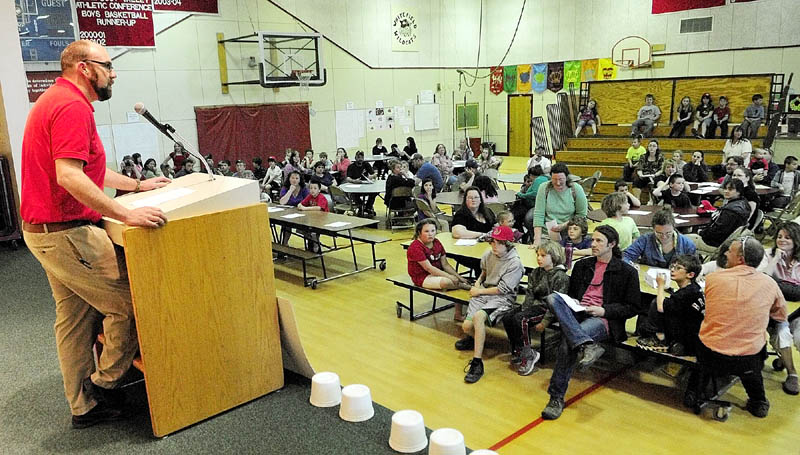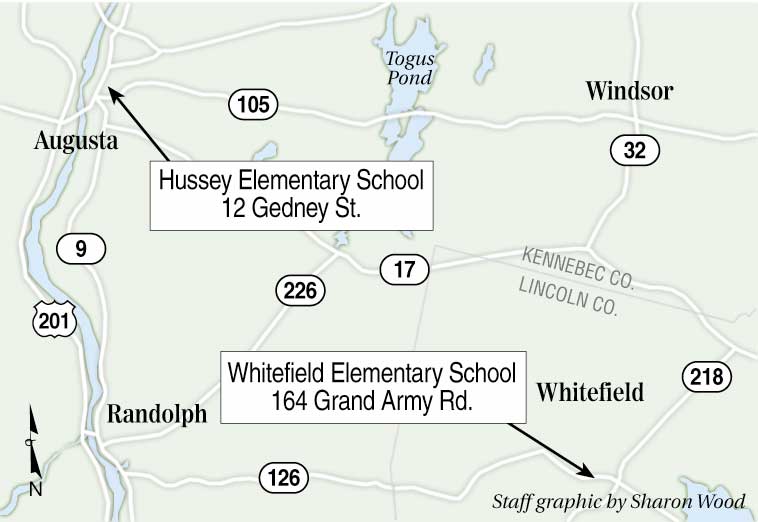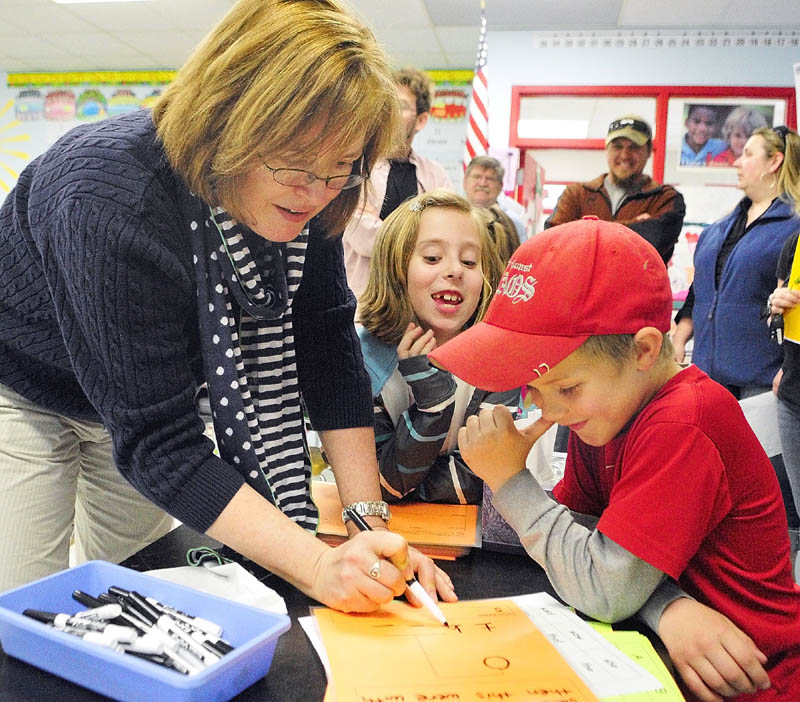WHITEFIELD — In the state’s eyes, Whitefield Elementary School is failing.
The state handed the school an F in the new grading system unveiled last week by Gov. Paul LePage. But school and district administrators say Whitefield has turned a corner, and recent initiatives haven’t had time to pay off yet.
“There’s nothing on the scorecard that surprised me,” Principal Josh McNaughton said.
The acting superintendent also wasn’t surprised at the grade and pointed to the limited resources available to teachers at Whitefield, such as decades-old books for reading exercises in class.
The A-to-F grading system the state unveiled Wednesday measures 2011-2012 scores in reading and mathematics, as well as students’ improvements. Grades for high schools also include graduation rates.
Most schools in the Augusta area, along with the rest of the state, received a C. Whitefield Elementary School is the only school in the area to receive an F.
Whitefield struggled across the board. Reading proficiency, and improvements in reading among the bottom 25 percent of students, were particularly troublesome.
McNaughton, in his second year at the kindergarten-through-grade 8 school, said the staff already has noticed strong improvement among students in the school’s intervention program, which helps students needing more support with literacy, mathematics or behavioral issues.
The school cut in half the number of students qualifying for the extra help since last year, McNaughton said.
This year has been the first year with an interventionist on the staff, and McNaughton is expecting bigger gains next year.
“It’s about change regardless of the score,” he said. “We recognize that our scores are not where we want them.”
Taryn Hammer, an owner of Sheepscot General at Uncas Farms, said the elementary school’s failing grade has been a popular topic around town since the state released the new grading system.
“It’s just everyone talking about Whitefield school getting an F, but they don’t know what that means or why,” Hammer said Thursday afternoon.
Sheepscot General also hosts community events, including classes and activities for children, and parents with young children are frequent visitors to the store.
Hammer said the impression she has gotten from parents is that the school had been improving since the new principal started two years ago, so she was surprised to hear about the F.
“I was kind of shocked to hear that — the worst in the whole area,” she said. “I’m shocked.”
Hilary Holm, chairwoman of the Regional School Unit 12 school board and a representative from Whitefield, said she thinks schools could do a better job of communicating successes and struggles to parents.
The district includes the towns of Alna, Chelsea, Palermo, Somerville, Westport Island, Whitefield, Windsor and Wiscasset.
“I think (the grade) will make the parents perhaps dismayed,” Holm said. “I hope it will motivate them to go to the school and say, ‘What can I do to help turn this school around?'”
She said Whitefield administrators were already well aware of the problems facing the school.
“If this publicizing motivates parents to become part of the solution, then it’s a good thing,” Holm said. “If it simply causes parents to — I don’t know a good term — bad-mouth the school, that’s not going to do anything for anybody. So I’m hoping the former will happen.”
McNaughton said another aspect that isn’t measured by the state’s grade, but has been a focus for the school, is growing community involvement.
The school hosted an education celebration Thursday evening that attracted more than 300 community members and had a silent auction that raised $3,200 for the local parent group’s campaign to build a new playground.
“We want to look at the school through a broad lens, not a narrow lens,” McNaughton said.
Acting Superintendent Patricia Watts lauded McNaughton and his school’s efforts, but she admitted that more work is needed to improve.
“I wasn’t surprised that Whitefield rated low,” Watts said. “We haven’t really had enough time to show what the potential is there, and I expect that letter grade will not stay for next year.”
Compared to the other schools in the district, Watts said, Whitefield Elementary School has more limited teacher resources, particularly books.
Watts heard about the resource shortfall from Whitefield teachers after she arrived at the district in 2011, she said.
Some teachers still were using the same books from when they were at the school, Watts said.
Teachers without the books they needed would print off pages of reading material for students to read from instead.
“Kids need real-life books,” Watts said. “If they’re going to read, they need picture books and historical books, and they were limited in their classrooms. So we tried to address that, and we have a ways to go.”
Watts said the district gave Whitefield an additional $5,000 for books and other materials last year. She requested $20,000.
Watts, also assistant superintendent and curriculum coordinator, said she’s anticipating the school’s grade to rise to a C or B if administrators are able to implement the school’s plan for next year.
The plan includes using two teachers trained as literacy coaches through a University of Maine partnership to provide professional development to other teachers in the district.
The literacy coaches recently finished their course work at the university, which allows them to instruct graduate-level courses for teachers and to work with teachers one-on-one for classroom improvements.
The professional development partnership program emphasizes the need of well-stocked book rooms with multiple copies of various types of books and reading levels, Watts said.
She contrasted Whitefield’s ill-equipped book room with one in Wiscasset, which she said has been built up over the years with multiple editions of books teachers can access.
Wiscasset Primary School scored a B overall from the state. It’s highest category was reading proficiency with 76.54 out of 100 points.
“With the budget with the way it is, we are really scrutinizing every penny,” Watts said, “but there are ways that we can creatively come up with money to purchase new books.”
She said that includes book fairs organized by McNaughton and the possibility of teachers making lists of books for parents or grandparents to buy when possible.
Lisa Kalloch, co-president of the school’s Parent Teacher Association, said the silent auction at the education celebration was one of the first major fundraisers they’re holding to raise around $45,000 to $50,000 for the new playground.
Kalloch, who has two daughters in the school, wouldn’t comment on the grading system or the grade Whitefield received, besides saying she thinks the teachers do a great job with the resources available.
Kristin Pennock, 44, has a seventh-grade son at Whitefield, and said she doesn’t think the grade is an accurate representation of the quality of education at the school.
Pennock said she thinks it’s more of an indication of the socioeconomic level of some of the students, mirroring comments from education experts who say the grading system reinforces the well-known positive correlation between income levels and standardized test scores. In Whitefield, 52 percent of the students qualify for free or reduced-price lunch.
“I think the teachers do the best with the resources they have,” Pennock said.
She said the largest flaw of the state’s grading system is its narrow focus.
“It’s just not a good measurement. Hopefully the teachers feel that,” Pennock said. “I think most parents support them and the underappreciated job they do.”
Paul Koenig — 621-5663
pkoenig@mainetoday.com
Send questions/comments to the editors.







Success. Please wait for the page to reload. If the page does not reload within 5 seconds, please refresh the page.
Enter your email and password to access comments.
Hi, to comment on stories you must . This profile is in addition to your subscription and website login.
Already have a commenting profile? .
Invalid username/password.
Please check your email to confirm and complete your registration.
Only subscribers are eligible to post comments. Please subscribe or login first for digital access. Here’s why.
Use the form below to reset your password. When you've submitted your account email, we will send an email with a reset code.